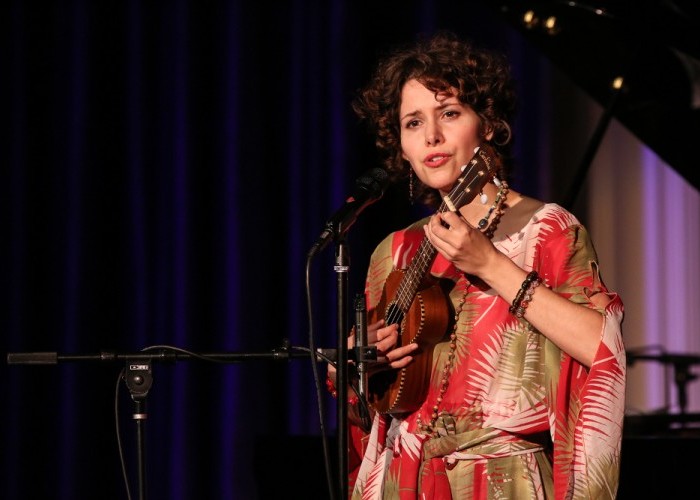Jan 13, 2026 2:09 PM
More Trump-Kennedy Center Cancellations
The fallout from the renaming of the John F. Kennedy Center for the Performing Arts to include President Donald…

Nellie McKay plays several instruments on her new album, including piano, ukulele, harmonica and cello.
(Photo: Mark Sheldon)During Nellie McKay’s recent performance at the venue SPACE in Evanston, Illinois, her affability was refracted by a harsh, yet humorous, worldview. Accompanying herself on ukulele and piano—with solos that referenced stride and bebop—she cheerfully sang sardonic couplets, such as, “Yeah, I’ll have my coffee black/Hey look, we’re still in Iraq” (a variation on the lyrics to her recorded version of “Toto Dies”). McKay’s sunny tone also updated the caustic 1960s declarations of Frank Zappa and Gene McDaniels. Earnest interpretations of Great American Songbook standards also fit snugly into her singular perspective.
McKay’s new album, Sister Orchid (Palmetto), focuses on those standards. But her outwardly warm renditions of songs like “My Romance” contain haunting undercurrents.
“Jazz used to be underground, and it’s become family friendly,” McKay said with an affectionate laugh. “To me, it’s the devil’s music, and that’s why it appeals. Who wants to be a role model?”
McKay spoke backstage at SPACE, where her mother, Robin Pappas, sat in on the chat. Just as in the performance, McKay blended seemingly disparate topics in a conversation that connected music with its wider social role, including discussion of pianist/singer Blossom Dearie (1924–2009), comedian Dick Gregory (1932–2017), contemporary totalitarianism and film noir. (The album title Sister Orchid was inspired by the 1940 gangster movie Brother Orchid.)
With the new recording, McKay focuses on classic jazz repertoire—a passion she’s held since childhood. A few jazz legends lived near her teenage home in Pennsylvania’s Pocono Mountains. Saxophonist Phil Woods offered a couple lessons. And she formed a lasting partnership with another neighbor, the late pianist and vocalist Bob Dorough (1923–2018).
“Bob was a ball of sunshine,” said McKay, who sings Dorough’s “Small Day Tomorrow” on the new album. “I talked to him just before he went. He always had energy—I always felt feeble next to Bob.”
Also as a teen, McKay worked in New York’s downtown cabarets and piano bars. She said that the training provided a better education than high school or her semester at the Manhattan School of Music. McKay used these experiences as melodic cues for the satires that shaped her 2004 debut, Get Away From Me (Columbia). Its success led to myriad opportunities, including film roles and staging tributes to such diverse personalities as comedian Joan Rivers and environmentalist Rachel Carson. Her version of “Willow Weep For Me,” on Sister Orchid, first appeared in her homage to transgender pianist Billy Tipton.
McKay plays an array of stringed instruments on the new album, but a sparse piano arrangement highlights her succinct phrasing on “The Nearness Of You.”
“I always want to put more on, but Robin was encouraging me to do less, and it became very simple,” McKay explained. “But too much is never enough. There are so many delights to try, why would you ever get full?” DB

Belá Fleck during an interview with Fredrika Whitfield on CNN.
Jan 13, 2026 2:09 PM
The fallout from the renaming of the John F. Kennedy Center for the Performing Arts to include President Donald…

Peplowski first came to prominence in legacy swing bands, including the final iteration of the Benny Goodman Orchestra, before beginning a solo career in the late 1980s.
Feb 3, 2026 12:10 AM
Ken Peplowski, a clarinetist and tenor saxophonist who straddled the worlds of traditional and modern jazz, died Feb. 2…

The success of Oregon’s first album, 1971’s Music Of Another Present Era, allowed Towner to establish a solo career.
Jan 19, 2026 5:02 PM
Ralph Towner, a guitarist and composer who blended multiple genres, including jazz — and throughout them all remained…

Rico’s Anti-Microbial Instrument Swab
Jan 19, 2026 2:48 PM
With this year’s NAMM Show right around the corner, we can look forward to plenty of new and innovative instruments…

Richie Beirach was particularly renowned for his approach to chromatic harmony, which he used to improvise reharmonizations of originals and standards.
Jan 27, 2026 11:19 AM
Richie Beirach, a pianist and composer who channeled a knowledge of modern classical music into his jazz practice,…